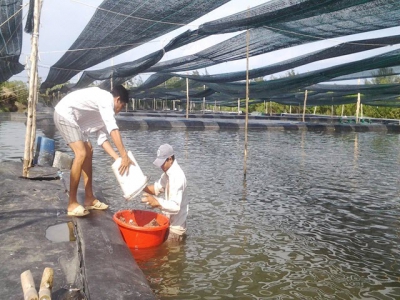Cần Giờ has enormous potential for high-value aquatic products, swift nests

Ho Chi Minh City – After switching to breeding spotted Babylon snails nine years ago Hùynh Văn Mảnh’s income has risen by multiple times compared to breeding shrimp or fish.
Farmers in HCM City’s Cần Giờ District collect spotted Babylon snails. VNS Photo Văn Châu
The farmer in HCM City’s Cần Giờ District said: “Compared to other aquatic creatures, spotted Babylon snails are easy to breed, contract diseases less and fetch high value. On a breeding area of around 7,000sq.m, the income is nearly VNĐ1 billion (US$43,000) a year.”
Long Hòa Commune in Cần Giờ District is good for spotted Babylon snails because the sea is clean and calm.
The breeding lasts three to five months.
The best time to release juveniles into the breeding area is in the late afternoon when the sun is about to set, and this ensures a high survival rate.
Mảnh breeds around eight million juveniles in a breeding area with a depth of three metres about 320m from land.
With its advantage as a coastal district, Cần Giờ also has the potential to develop the swifts’ nest industry.
The swift-breeding industry has developed rapidly in Việt Nam, mainly in southern provinces and cities.
Around 5,800 houses had been built for breeding the birds in 41 provinces and cities by the end of last year, with around 6.1 million birds producing nearly 50 tonnes of nest a year.
HCM City has the highest number of swift farms. It has 542 swift nesting houses in 19 districts, 231 of them in Cần Giờ, where more than six tonnes of nests are harvested annually.
Currently raw bird’s nest fetches VNĐ20-30 million (US$880-$1,322) per kilogramme while it is VNĐ40-45 million for refined nests, and even VNĐ100-200 million for some special varieties.
According to the Việt Nam Swiftlet Farmers Association, building houses for swift breeding is growing at 23-25 per cent a year.
To achieve sustainable development, Cần Giờ District authorities should draft sanitation regulations for these houses and make zoning plans to create favourable conditions for investors, experts said.
Measures to minimise the impacts on the birds’ natural prey species are also needed, they added.
In Cần Giờ, besides spotted Babylon snails and swift nests, some 300 farmers have also switched to other high-value creatures such as oyster, clam and grouper fish.
Related news
 Shrimp exports expected to enjoy fruitful advantages throughout 2020
Shrimp exports expected to enjoy fruitful advantages throughout 2020 Domestic shrimp firms are expected to enjoy a wealth of opportunities that will ease the export of their products to the EU, the United States, and Japan
 Tuna exports expand 10 percent in 2019
Tuna exports expand 10 percent in 2019 Last year, Vietnam’s tuna exports exceeded 719 million USD, an increase of 10.2 percent from 2018
 U.S. to re-evaluate food safety for Vietnamese tra fish next month
U.S. to re-evaluate food safety for Vietnamese tra fish next month The Food Safety and Inspection Service (FSIS) under the U.S. Department of Agriculture is expected to send a working team to Vietnam to evaluate